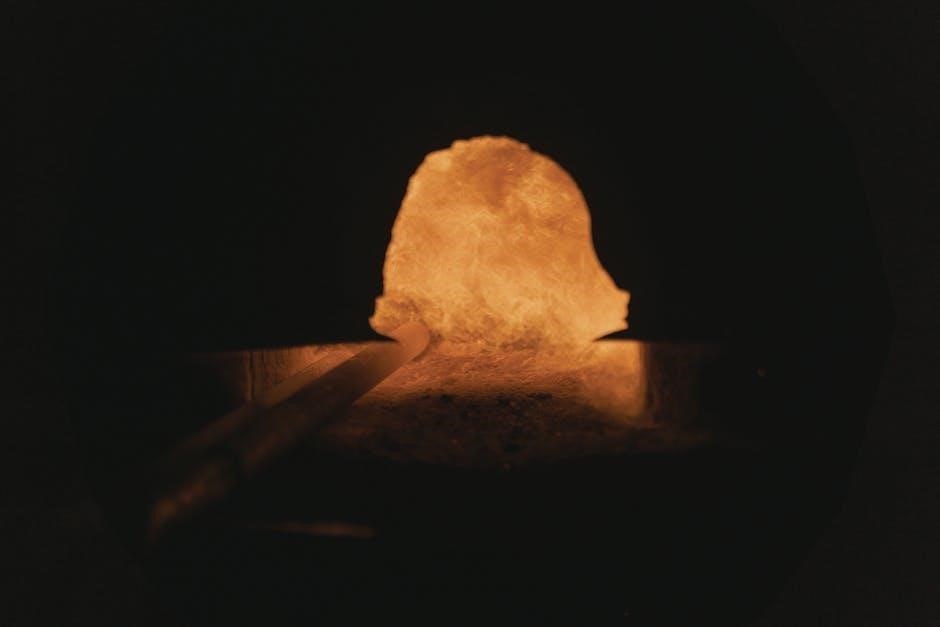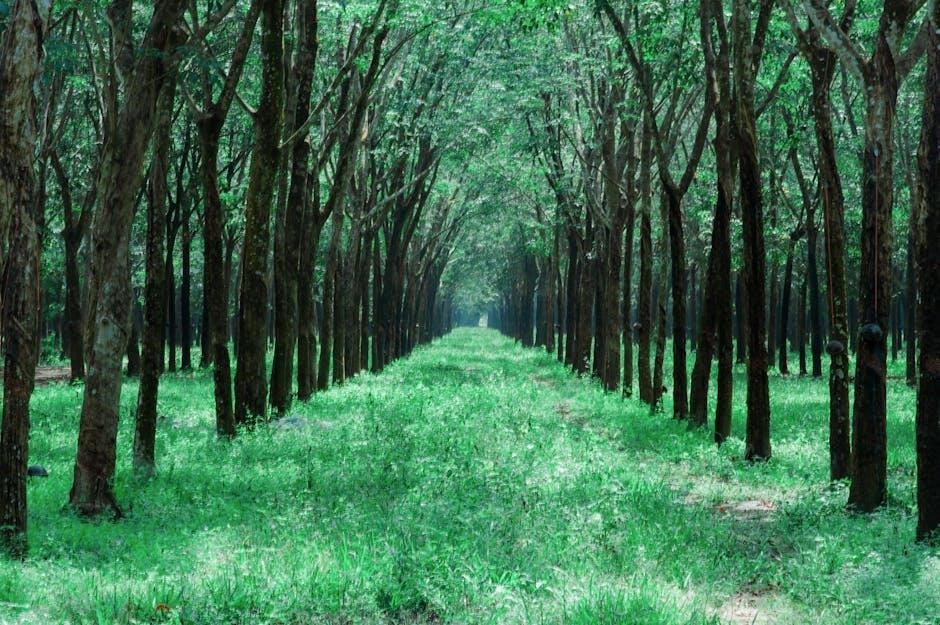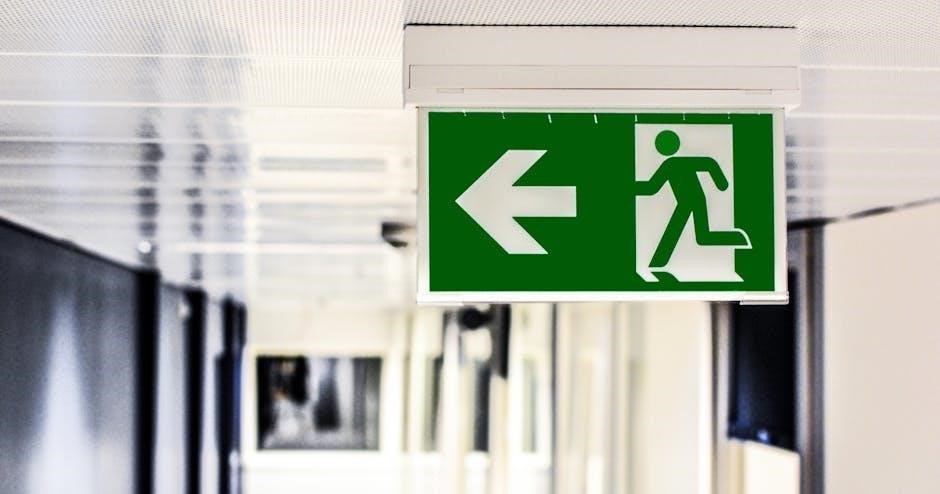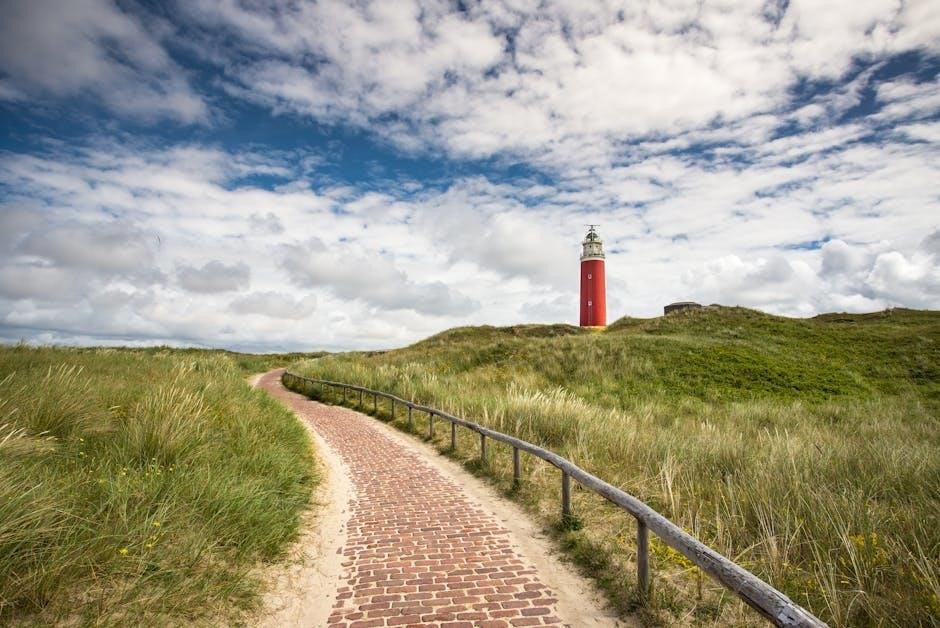Blacksmithing in EverQuest is a vital tradeskill that involves crafting metal items, essential for both combat and other tradeskills, shaping the game’s economy and progression.
Overview of Blacksmithing as a Tradeskill
Blacksmithing, often referred to as Smithing, is a core tradeskill in EverQuest that revolves around crafting metal items such as weapons, armor, and components for other tradeskills. It is a fundamental skill that allows players to shape raw ores and metals into useful tools and equipment, making it indispensable for both personal progression and the in-game economy. Blacksmithing requires the use of a forge, where raw materials are combined to create desired items. The skill is governed by the player’s intelligence, wisdom, or strength, depending on which is highest. While it can be challenging to level due to the complexity of combines and material costs, mastering blacksmithing opens up opportunities for crafting high-end gear and supporting other tradeskills like tailoring and enchanting. Advanced techniques include racial and cultural recipes, adding depth and customization to the craft.
Importance of Blacksmithing in the Game Economy
Blacksmithing plays a pivotal role in EverQuest’s economy by providing essential goods for players and supporting other tradeskills. Crafted items like weapons, armor, and components are in high demand, making blacksmiths key suppliers. Rare materials and templates, such as Vanadium and Palladium, are highly sought after, enabling blacksmiths to profit through the Bazaar. The skill’s versatility allows for crafting intermediates like Steel Boning, crucial for tailoring, and Fine Plate Gear, which requires rare resources like Leather Padding. Market trends for ores and metals fluctuate, affecting supply and demand, making cost management vital for profitability. By understanding these dynamics, blacksmiths can optimize their crafting choices, ensuring they remain competitive in the game’s vibrant economy. This trade skill not only empowers individual progression but also serves as a cornerstone for the broader in-game market, influencing prices and player activities across Norrath.

Getting Started with Blacksmithing
Begin your journey by training with a tradeskill master and acquiring essential tools like a Smithy Hammer. Locate a forge in major cities to start crafting and progressing effectively.
Training Your Blacksmithing Skill
Training your blacksmithing skill begins by visiting a tradeskill master in major cities like Qeynos or Freeport. Spend your early skill points to reach level 21, which is cost-effective and straightforward. This initial phase requires minimal materials, focusing on basic combines like metal bits. Once trained, you can start crafting simple items while progressing. Forges located in cities are essential for crafting, and having the right tools, like a Smithy Hammer, is crucial. Early training lays the foundation for more complex recipes later. Keep experimenting with different materials to improve your skill and efficiency. This step is vital for unlocking higher-level recipes and contributing to the game’s economy. Consistent practice and resource management will help you advance smoothly in your blacksmithing journey.
Essential Tools and Equipment
To begin blacksmithing, you’ll need a few essential tools and equipment. A Smithy Hammer is your primary tool, obtained from vendors like Kanio or Tallis Paerk in major cities. A File and File Mold are crucial for refining metals, with the File crafted using blacksmithing skills. Forges are found in cities like Qeynos or Freeport, serving as your workspace. Additional tools include Tongs for handling hot metals and an Anvil for shaping items. A Water Flask is necessary for cooling metals during crafting. Fuel, such as coal or wood, is required to heat the forge. Sturdy Leather Padding and Metal Bits are often used in early recipes. Equipping these tools ensures you can craft effectively, from basic items to complex armor and weapons. Having the right equipment is vital for advancing your blacksmithing skills and creating high-quality items efficiently.
Locating Forges in Major Cities
Forges are essential for blacksmithing and can be found in most major cities across Norrath. In Qeynos, the forge is located near the blacksmithing trainer in the southern part of the city. Similarly, in Freeport, you’ll find a forge in the southeastern district, close to the city’s blacksmithing vendors. Other cities like Halas and Cabilis also have accessible forges, typically near their respective blacksmithing trainers. To locate a forge quickly, consult the city map or ask a guard for directions. Forges are often placed in industrial or crafting districts, making them easy to identify. Once you’ve found a forge, you can use it to craft items, provided you have the necessary materials and tools. Forges are shared resources, so expect to see other players crafting alongside you. Knowing where to find these forges is crucial for advancing your blacksmithing skills efficiently.

Blacksmithing Leveling Guide
This guide provides a detailed approach to efficiently level your blacksmithing skill from 1 to 300, focusing on essential recipes, skill progression, and resource management for optimal crafting.
Levels 1-21: Training and Initial Progression
Begin your blacksmithing journey by training your skill up to level 21, a straightforward process that requires minimal resources. Visit a tradeskill master in any major city to invest in skill points. This phase is cost-effective, focusing on basic recipes like metal bits, which are essential for early progression. Once you reach level 21, you’ll have a solid foundation to progress further. This initial stage is crucial for building familiarity with the crafting system and preparing for more complex recipes in higher levels. Keep a stock of metal bits, as they will be useful for future combines. This phase sets the groundwork for advancing your blacksmithing skill efficiently.
Levels 21-37: Steel Boning and Early Recipes
Once you reach level 21, focus on crafting steel boning, a critical component for both blacksmithing and other tradeskills like tailoring. Steel boning is crafted using a forge, metal bits, and water, making it a cost-effective way to progress. During this phase, you’ll also unlock early recipes such as scalers and dairy spoons, which are essential for skill progression. These recipes are trivial at specific levels, ensuring consistent skill gains. As you craft, prioritize creating items until they become trivial to minimize resource waste. Steel boning remains a valuable resource for higher-level crafting, making it a worthwhile investment of time and materials. This phase lays the groundwork for more complex recipes and ensures a smooth transition into the next stage of your blacksmithing journey.
Levels 37-68: Crafting Large Lanterns
From level 37 to 68, focus on crafting large lanterns, a reliable method for skill progression. Large lanterns are crafted using steel boning, metal bits, and a lantern mold, making them a cost-effective option. These lanterns are trivial at level 68, ensuring steady skill gains throughout this phase. They are also in demand across various tradeskills, contributing to the game’s economy. Crafting large lanterns efficiently requires managing your resources to avoid unnecessary expenses. This phase is crucial for building a foundation in blacksmithing, as it prepares you for more complex recipes in later levels. The consistent skill progression and economic value of large lanterns make them an ideal choice for this stage of your journey.

Levels 68-122: Banded Armor and Weapons
From level 68 to 122, focus on crafting banded armor and weapons, which provide excellent skill progression and are highly sought after by players. Banded armor pieces, such as bracers, helms, and boots, are crafted using metal bits, steel boning, and leather padding. Weapons like short swords and daggers are also key recipes during this phase. These items are not only useful for personal equipment but also in demand on the market, making them a profitable craft. The materials required are relatively accessible, with leather padding being a common bottleneck. Crafting banded armor and weapons ensures steady skill gains and prepares you for more complex recipes in later levels. This phase is vital for mastering intermediate blacksmithing techniques while contributing to the game’s economy. Efficient resource management is crucial to minimize costs and maximize progress.
Levels 122-188: Fine Plate Gear and Intermediates
From level 122 to 188, blacksmithing shifts to crafting fine plate gear and essential intermediates, which are crucial for both progression and profitability. Fine plate armor, such as breastplates and greaves, requires rare materials like spiderling silks and large quantity pelts, often dropping in zones like East Karana. These recipes are more complex but yield higher returns in skill gains and market demand. Intermediates, such as steel boning, remain vital for other tradeskills, ensuring blacksmithing’s central role in the game’s economy. This phase is challenging due to the scarcity of reagents and higher failure rates, making each successful craft valuable. Players should focus on balancing progression with market trends to maximize profitability. Fine plate gear and intermediates lay the groundwork for advanced crafting, making this phase a critical step in mastering blacksmithing.
Levels 188-240: Advanced Crafting Techniques
Reaching levels 188-240 in blacksmithing introduces advanced techniques, focusing on high-end recipes and rare materials like Vanadium and Palladium ore. These levels emphasize crafting intricate weapons, armor, and components for other tradeskills. Players can craft advanced items such as Planar Metal Sheets and Envenomed weapons, which are highly sought after by high-level characters. The bottleneck often lies in obtaining rare ores like Tantalum and Tungsten, which can be costly or time-consuming to acquire. Success in this range requires precise planning and resource management to minimize costs and maximize skill gains. Crafting advanced gear not only boosts your skill but also enhances your reputation as a master blacksmith, making these levels a critical step toward achieving 300. The ability to create high-demand items makes this phase both challenging and rewarding, shaping your journey to blacksmithing mastery.
Levels 240-300: Mastering High-End Recipes
Reaching levels 240-300 in blacksmithing marks the pinnacle of mastery, focusing on crafting high-end recipes that demand precision and rare materials. Players can create intricate weapons like spectral blades and legendary armor sets, which are highly prized by top-tier characters. This phase introduces advanced techniques such as crafting Planar Metal Sheets and Envenomed weapons, requiring components like Fetid Essence and racial sewing kits. The Luclin expansion brings new challenges, offering recipes for items like Thalium Plate Cloaks and Tungsten Chain Belts. Success in this range hinges on efficient resource management and understanding market trends to minimize costs. Crafting high-demand items not only enhances your reputation but also solidifies your role as a master blacksmith. This final stretch is both challenging and rewarding, culminating in the ability to craft items that shape the game’s economy and high-end content.

Advanced Blacksmithing Techniques

Advanced blacksmithing involves crafting high-end armor and weapons, utilizing racial and cultural recipes, and creating components for other tradeskills, enhancing efficiency and profitability in the game’s economy.

Crafting High-End Armor and Weapons
Mastering the art of crafting high-end armor and weapons is a cornerstone of advanced blacksmithing in EverQuest. As players progress beyond level 200, they gain access to intricate recipes that require rare materials like Vanadium, Tungsten, and Osmium. These resources, often sourced from specific zones or the in-game bazaar, allow blacksmiths to create powerful gear sought after by top-tier players. Crafting high-end items involves precise combinations of ores, molds, and other components, with success often depending on the blacksmith’s skill level and racial traits. Many advanced recipes, such as those for Fine Plate Gear, require additional steps like refining ores or acquiring drops from challenging zones. The process is both time-consuming and costly, but the rewards are substantial, as high-quality armor and weapons command premium prices. This phase of blacksmithing is where mastery truly shines, offering both a challenge and a sense of accomplishment for dedicated crafters.
Utilizing Racial and Cultural Recipes
Racial and cultural recipes in EverQuest blacksmithing offer unique opportunities for crafters to create specialized gear. These recipes often leverage lower-triviality ores, reducing material costs while still allowing skill progression. For instance, certain racial forges enable access to exclusive patterns, such as racial sewing kits, which can only be crafted in specific cities. Additionally, cultural recipes may require components like Fetid Essence or Envenomed materials, which can be sourced from particular zones or merchants. These recipes not only provide a cost-effective way to skill up but also allow blacksmiths to create items tailored to their race or class, enhancing their utility. Utilizing these recipes requires a mix of strategy and resourcefulness, making them a valuable asset for crafters aiming to optimize their progress and create distinctive gear.

Creating Components for Other Tradeskills
Blacksmithing plays a crucial role in crafting components essential for other tradeskills, such as tailoring, enchanting, and more. For example, Steel Boning is a fundamental item used in tailoring recipes, while Metal Bits are versatile components for various crafts. High-level blacksmiths can create intermediate items like Fine Plate Gear, which requires materials such as Leather Padding and spiderling silks. These components often serve as bottleneck items in other trades, making blacksmithing a cornerstone of crafting efficiency. By producing these intermediates, blacksmiths not only support their own progression but also enable other crafters to create advanced items. This interdependence highlights the importance of mastering blacksmithing, as it directly impacts the broader crafting economy and accessibility of high-end gear in EverQuest.

Economy and Market Considerations
Blacksmithing significantly impacts EverQuest’s economy, as crafted armor and weapons are in high demand. Rare ores and metals drive market trends, influencing profitability and crafting strategies for blacksmiths.
Selling Blacksmithing Templates in the Bazaar
Selling blacksmithing templates in the Bazaar is a lucrative way to profit from your crafting skills. High-demand templates, such as those for Vanadium and Palladium armor, often fetch premium prices due to their utility in crafting advanced gear. Rare materials like Tungsten and Cobalt ores can significantly increase the value of your templates, making them sought after by high-level crafters. To maximize profits, research current market trends and adjust your pricing accordingly. Templates for racial or cultural recipes, such as those requiring Fetid Essence or Envenomed components, can also command higher prices. Keep an eye on supply and demand, as oversaturation can drive prices down. Additionally, consider crafting templates for intermediate items, like Large Bricks or Files, which are essential for other tradeskills. By strategically selling your templates, you can not only fund your crafting endeavors but also establish yourself as a key supplier in the EverQuest economy.
Cost Management for Rare Materials
Managing costs for rare materials in blacksmithing is crucial to maintain profitability and efficiency. High-end ores like Vanadium, Palladium, and Tungsten can be expensive, so sourcing them at the lowest possible price is essential. Farming these materials in specific zones or purchasing them during low-demand periods can significantly reduce expenses. Utilizing racial or cultural recipes allows the use of lower-cost alternatives without compromising skill progression. Additionally, crafting components like Leather Padding or Spiderling Silks, which require rare drops, should be planned meticulously to avoid unnecessary expenditure. Storing surplus materials and selling them when demand spikes can also offset costs. By optimizing your material acquisition and usage, you can minimize financial strain while progressing your blacksmithing skills and producing high-quality items.
Understanding Market Trends for Ore and Metals
Understanding market trends for ore and metals is essential for efficient blacksmithing in EverQuest. Prices of rare materials like Tungsten, Vanadium, and Palladium often fluctuate based on player demand, expansion content, and server population. High-end ores are sought after for crafting advanced armors and weapons, making them valuable commodities. Monitoring the Bazaar and EQTraders can help track current market rates, ensuring you buy materials at optimal prices. For example, Tungsten Ore is highly prized for crafting late-game equipment, while Vanadium remains popular for mid-tier gear. By staying informed about supply and demand, you can avoid overpaying for materials and maximize profits when selling crafted items; Adapting to market shifts ensures your blacksmithing operations remain cost-effective and competitive in the game’s economy.

Additional Resources and Tips
Consult community guides, such as Stillwaters’ blacksmithing guide, for detailed strategies and quest information. Utilize tools like EQTraders for market analysis and mods for crafting efficiency and progression tracking.
Best Zones for Farming Ore and Materials
Farming ore and materials is crucial for blacksmithing progression. Zones like East Karana, Lake Rathetear, and the Feerrott are rich in ore deposits, especially for lower-level materials. Higher-level zones such as the Buried Sea and Kod’Tazik’s Forge are ideal for rarer metals like Tungsten and Vanadium. For specific materials, such as Leather Padding, East Karana remains a top choice due to its abundance of spiderling silks. Additionally, the Gorukar Mesa is known for drops needed for Envenomed pieces. Always consider the cost of materials in the bazaar and farm during off-peak hours for better availability. Utilizing racial forges and cultural recipes can also optimize your material gathering. For advanced materials like Thalium Ore, low-level zones or the bazaar are reliable sources. Efficient farming strategies ensure you can craft high-quality gear and components without breaking the bank.
Essential Quests for Blacksmithing Progression
Completing specific quests is vital for advancing your blacksmithing skills. The GoD ore refinement quest grants the ability to process high-end ores, crucial for later stages. Quests like those in the Planes of Power expansion provide rare materials and patterns for advanced crafting. Additionally, racial-specific quests, such as those for cultural armor, often reward exclusive recipes and components. For example, the Luclin expansion offers quests for shadowscream metal, essential for high-level plate armor. Completing these quests not only enhances your crafting capabilities but also unlocks unique items and shortcuts. Prioritize these quests early in your progression to avoid material shortages later. Quest rewards often include molds, templates, and rare ores, which are indispensable for crafting high-end gear and intermediates. Regularly checking quest hubs in major cities and expansions ensures you don’t miss out on valuable opportunities to enhance your blacksmithing prowess.
Recommended Tools and Mods for Efficiency
Maximizing efficiency in blacksmithing requires the right tools and modifications. In-game tools like forges, molds, and files are essential for crafting. Forges are readily available in major cities, while specific molds, such as those for lanterns or armor, can be purchased from vendors. Mods like EQTraders and MQ2 enhance inventory management and crafting automation, significantly speeding up the process. Additionally, third-party tools like spreadsheets for recipe tracking and cost analysis are invaluable. Mods such as MQ2Traders can automate selling templates in the bazaar, reducing downtime. Inventory management mods help track ores and materials, ensuring you never run out mid-craft. Community-created tools, such as crafting guides and calculators, provide optimized recipes for skill progression. By leveraging these tools and mods, you can streamline your blacksmithing workflow, reduce costs, and focus on crafting high-quality items efficiently. These resources are widely available and supported by the EverQuest community.
Blacksmithing in EverQuest is a rewarding journey, transforming raw materials into powerful gear. Mastering this trade not only enhances your character but also impacts the game’s economy, offering endless opportunities for growth and creativity.
Final Thoughts on Mastering Blacksmithing
Mastering blacksmithing in EverQuest is a testament to dedication and creativity. This tradeskill offers immense satisfaction, transforming raw ores into powerful gear that shapes the game’s economy and progression. While the journey can be challenging, especially during the early levels, the ability to craft high-end armor and weapons makes it highly rewarding. Players must balance cost management, market trends, and recipe choices to optimize their progress. Utilizing racial recipes and advanced techniques can significantly enhance efficiency. The trade’s complexity ensures that even veteran players continue to discover new strategies and opportunities. By focusing on skill progression and resource optimization, blacksmiths play a crucial role in both their personal advancement and the broader server economy. This craft remains a cornerstone of EverQuest’s gameplay, offering endless possibilities for innovation and mastery.
Continuing Your Journey in EverQuest
Continuing your journey in EverQuest as a blacksmith opens up endless opportunities for growth and contribution. As you master higher-level recipes, you’ll unlock the ability to craft intricate armor and weapons, becoming a vital asset to your guild and the server’s economy. Exploring new zones and expansions, such as the Plane of Luclin, will provide access to rare materials and exclusive recipes, keeping your craft fresh and exciting. Additionally, participating in dynamic events and server-wide initiatives can further enhance your blacksmithing prowess. The ever-evolving nature of the game ensures that there’s always something new to discover, whether it’s refining your techniques or experimenting with innovative combinations. By staying engaged with the community and adapting to market demands, you’ll continue to thrive as a blacksmith, shaping the world of Norrath one forge at a time.
